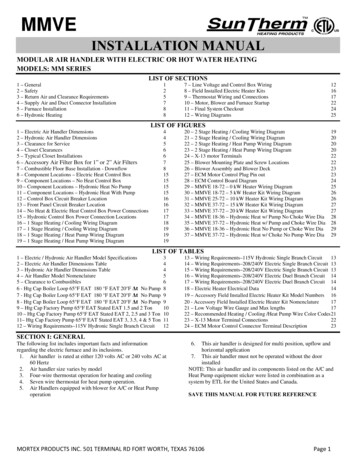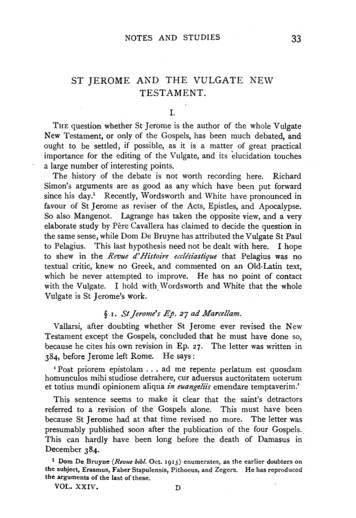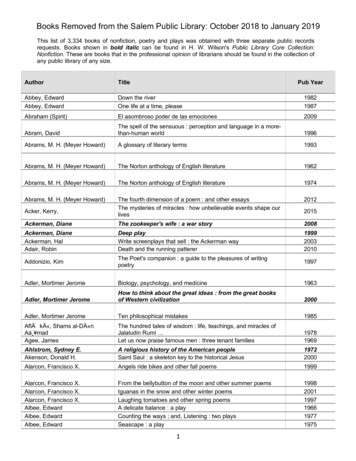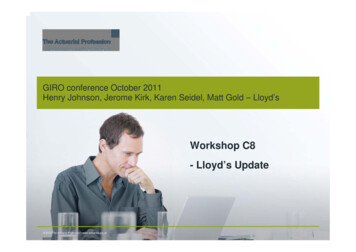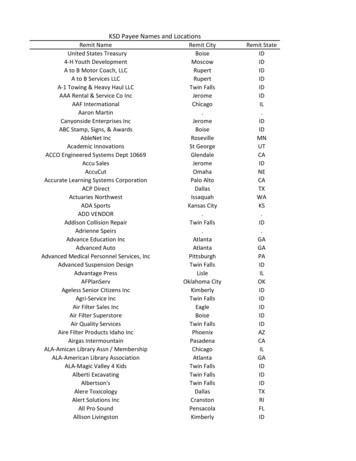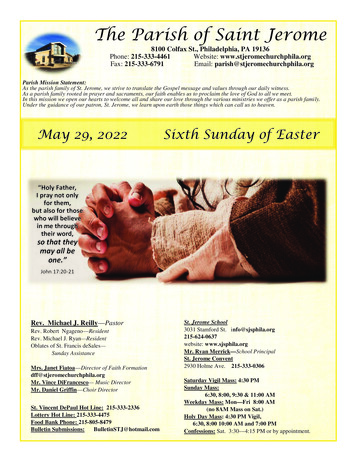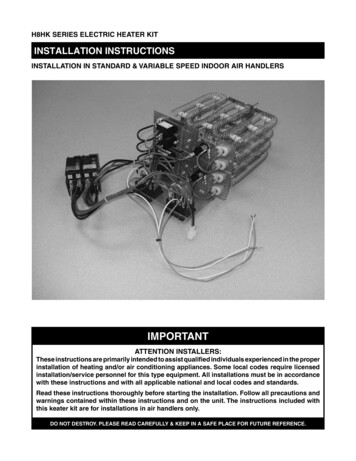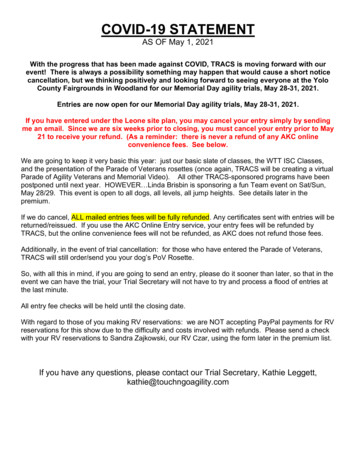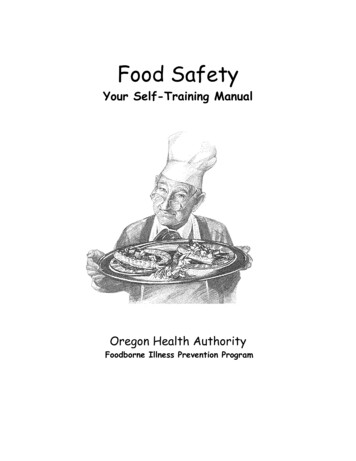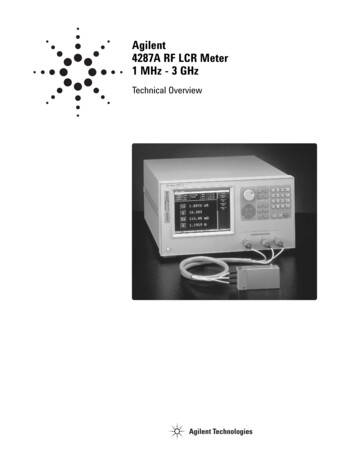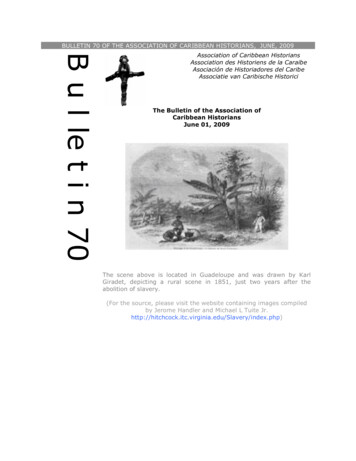
Transcription
BULLETIN 70 OF THE ASSOCIATION OF CARIBBEAN HISTORIANS, JUNE, 2009B u l le t i n 70Association of Caribbean HistoriansAssociation des Historiens de la CaraibeAsociación de Historiadores del CaribeAssociatie van Caribische HistoriciThe Bulletin of the Association ofCaribbean HistoriansJune 01, 2009The scene above is located in Guadeloupe and was drawn by KarlGiradet, depicting a rural scene in 1851, just two years after theabolition of slavery.(For the source, please visit the website containing images compiledby Jerome Handler and Michael L Tuite .php)
2WELCOME TO THE ACH BULLETINJUNE 1, 2009TABLE OF CONTENTSEXECUTIVE COMMITTEE . 3MESSAGE FROM THE OUT-GOING PRESIDENT – VERENE A. SHEPHERD . 4MESSAGE FROM THE IN-COMING PRESIDENT - FERNANDO PICÓ . 6ADVANCE INFORMATION: 42ND ANNUAL ACH CONFERENCE, BARBADOS, 2010 . 7CALL FOR PAPERS 7INSTRUCTIONS TO PROPOSERS 7ACH PANEL PROPOSAL FORM 9AGM MINUTES . 11ACH FINANCIAL REPORT, MAY 2008-MAY 2009 14EXPENSES OF SECRETARIAT 14SPECIAL ANNOUNCEMENT . 17THE GOUND-SAUNDERS MEMORIAL ENDOWMENT FUND 17ACH MEMBERSHIP FORM . 18OBITUARY . 19
3EXECUTIVE COMMITTEE 2009-2010During the Annual General Meeting held at La Plantation Hotel, Guadeloupe on May 14,2009, the following persons were elected to the Executive Committee:EXECUTIVE COMMITTEEPRESIDENTFernando PicoUniversity of Puerto Rico1940 Sauco, Urb.Santa María,San Juan,Puerto Rico,e-mail :fafpico@hotmail.comVice- PresidentBernard MoittVirginia Commonwealth UniversityHistory DepartmentPO Box 842001Richmond VA 23284-7085e-mail : bmoitt@mail2.vcu.eduSecretary-TreasurerPedro L.V. WelchUniversity of the West IndiesCave Hill, BarbadosTel: (246) 417-4388/87 (w)e-mail: pwelch@gmail.com orachbulletin@yahoo.comHeather CateauDepartment of HistoryUniversity of the West IndiesSt. AugustineTrinidade-mail: heather.cateau@sta.uwi.eduVerene Shepherd (former president)Faculty of Humanities & EducationUWI-MonaKingston 7, JamaicaTel: 876-970-4441 (Office)e-mail: officeofprofshepherd@yahoo.comKathleen MonteithDepartment of History and ArchaeologyUWI-MonaKingston 7, JamaicaTel: 876-421-5463.e-mail: kathleen.monteith@uwimona.edu.jmRosalyn Terborg-PennMorgan State University, Professor Emerita5484 Sleeping Dog LaneColumbia, MD 21045, USATel: 410-730-4296e-mail : rosalynterborgpenn@yahoo.com &rterborg@comcast.netJacques DumontUFR STAPS,Université des Antilles et de la GuyaneCampus de FouilloleBP 25097 157 Pointe à Pitre cedexGuadeloupe, FWITel: 0690 55 55 26e-mail: Jacques.dumont@univ-ag.fr
4MESSAGE FROM THE PRESIDENTMESSAGE FROM THE OUT-GOING PRESIDENT – VERENE A. SHEPHERDThe following message was delivered by the then President of the ACH at the OpeningCeremony of the 41st annual ACH Conference held at La Plantation Resort Hotel on Sunday,May 10, 2009:“Mme. Kacy Fely Bembuck, Representative Conseil Règional, Mons. LaurentBernier, Mayor du St. François, other distinguished guests, members of theACH family, bonsoir/ buenas tardes/good evening. On behalf of themembership, I wish to express heartfelt appreciation to those colleagues whoform the Local Organizing Committee and who persevered with thearrangements for this Conference, despite the odds. Let us applaud JacquesDumont, Alain Buffon, Jacques Adelaide and Gerard laFleur. I do not have torehearse the reasons for their challenging work; what Rex Nettleforddescribes as the „CNNization‟ of the world ensures that news travels aroundthe world in real time. But I will say this: we live in a Caribbean that has notyet completed the process of decolonization. As a result, social and politicaltensions are going to characterize the relationship between the contendingforces; for in 2009 as in the period 1791-1886 and beyond, resistance isgoing to be the manifestation of the search for justice and true selfdetermination by colonized and former-colonized peoples alike. I join othersin hoping that the people of Guadeloupe will be successful in theirnegotiations with the policy-makers in France.I am happy to see that ACH members were not deterred by the prospect ofspending a long time here but are here showing support. Of course, that ournumbers are smaller than usual is not an indication that others were afraid toattend. (And by the way, let me hasten to extend apologies for absence fromEC members Rosalyn Terborg-Penn and Antonio Gaztambide and in-comingVP Bernard Moitt. Rosalyn will join us later but the others could not be herefor various reasons). Several people could not attend because the economicdownturn in global economies has affected travel budgets in mostuniversities. So now, „fiscal restraint‟ is the buzz term for academics also. Oneeffect on the ACH is obvious: the local and regional participation exceeds thatfrom North America and Europe.I applaud our sponsors for their support in these difficult financial times. Wewill of course discuss this matter of financing ACH conferences more fully atthe AGM on Thursday; but it should be obvious that the time has come for theACH to rethink the way it funds its conferences. We will have to make toughdecisions about the level of dues and the registration fees; about the budgetfor translation; about the production of papers as opposed to a book ofabstracts or CDs; about the reasons we cannot find a way to include some ofour Caribbean neighbors such as Grenada, St. Lucia, St. Kitts, Nevis - ashosts of ACH conferences – but more on those matters later.I thank the members of the Executive Committee for their dedicated work andinnovative ideas over the past year and wish best of luck to those who will
5rotate off the Committee. The EC would welcome your feedback on theseinnovations, some of which - like the plenary by a bright, young scholar, theroundtable on a current local issue and the combining of the roles of chairsand discussants - will be obvious from the programme, as together we seekto build, renew and improve this important Association. I also call attentionto those we have lost, the most recent being long-time and faithful member,Burghart Turner and past president Gail Saunders‟ late father, Mr. BasilNorth.It has been my pleasure to be the President of the ACH over these threeyears. In fact, I deem it an honor to have been asked to serve. As I approachthe final leg of this journey, let me thank those of you who supported mypresidency, especially at rocky times when I did not confine my role toshaking hands and kissing babies. But you know me. By the way, because ofthe WHO warning, please note that there will be no shaking and kissing atthis Conference!I greet our honorary life members, new and old life members, all pastpresidents (to whom we continue to look for guidance); and those attendingtheir first ACH Conference and ask them to stand and be recognized. I nowcall on the newest Life Member, Dr. Pedro Welch, to collect his certificate. Iwill have the chance to meet the new members at the President‟s Lunch fornew presenters later in the week.It is also my pleasure to announce that the winner of the Andres RamosMattei/Neville Hall Best Article Prize is Bertie Mandelblatt and thank thecommittee that read the entries for its workAll that is left for me to do now is to thank our hosts and sponsors once more,declare this 41st ACH conference open, and wish everyone a successfulconference; one that will be collegial, intellectually gripping and conceptuallyrich.”
6MESSAGE FROM THE IN-COMING PRESIDENT - FERNANDO PICÓAs it approaches its 50th anniversary, the Association of Caribbean Historians has manyreasons to celebrate. Its achievements are many, and the scope of its influence is widening.In reaching its half-century mark the Association has three new important tasks toaccomplish. The Caribbean region has undergone many changes in the last five decades,not only in its institutions and economy, but also in its cultures and the ways in which theyare represented worldwide. Caribbean men and women have established communities in theprincipal economic centers of the North Atlantic, and these communities have become vocaland articulate participants in the discussions of a wider world. The niches that the Caribbeanoccupies in the global community do not guarantee permanent advantages in the planet‟seconomy, but they provide a measure of well-being to its peoples.This complex reality has to be understood not in terms of one island or people, but in acollective dimension, on a regional basis. How we have come to the present circumstances,and what stresses and strains this situation puts on the fabric of Caribbean unity andsolidarity need to be studied and understood in a historical perspective. We have becomeadept at understanding the past in the light of the present, but we must also discern thepatterns of the present in their relation to previous processes.This task requires the benefit of many perspectives. The Association has always reached outto all the corners of the Caribbean to make its discussions wider and more profound. Thismulti-national, multi-lingual heritage must be enhanced, so that scholars, young and old,from all the Caribbean peoples take part in the discussions of the roles the Caribbean playsin the modern world. Thus the task of discussing the present requires the task of ensuringthat all points of view are represented in the discussion.The third task may seem easier. The Association has always proposed a model of straightacademic discussion which is free of the usual banalities and pretentiousness of otheracademic congresses. We have always emphasized the need to have innovative researchand tough discussions in a framework of fraternal communication. We have kept ourselvesattuned to the rhythms of the host societies in whose midst we have met. We have fostereda mode of discourse which is frank, forthright and relevant. How to keep and enlarge thisCaribbean way of discussing history challenges our ingenuity and inventiveness,We hope to see all in Barbados next spring.
742nd ANNUAL CONFERENCE, BARBADOS, 2010ADVANCE INFORMATION: 42ND ANNUAL ACH CONFERENCE, BARBADOS, 2010The 42nd Annual Conference of the Association of Caribbean Historians is scheduled for2010, in Barbados. No firm date is yet available, but it seems that the period beingconsidered will be mid-May. The venue will be published in the December bulletin. Barbadosis a popular tourist destination and is well served with hotels with a wide range of pricing.Most hotels have websites and an internet search should provide ACH members with somegeneral picture of the prices on the island. The exchange rate is currently pegged at 2Barbados dollars to the US dollar.Following a recent agreement with the EU, with effect from June 1, 2009, no visa is requiredfor visitors from the member countries of the EU. There is also no visa requirement forNorth Americans (USA, Canada). Visitors from CARICOM countries, which now includeSuriname, do not require visas. The island is well served with airlines from the USA andfrom the UK.CALL FOR PAPERSThe following themes have been proposed for the 41st Annual Conference of the ACH: Mercantile Business in the CaribbeanCaribbean economies of the late 19th and early 20th centuriesThe impact of colonization on the flora and fauna of the CaribbeanThe impact of History on the Literature of the CaribbeanCaribbean connections to the larger respective empiresCommemoration and MemoryHealth Issues in Caribbean HistoryThe teaching of Caribbean History/Teaching methodologiesThe contribution of Walter Rodney to Caribbean HistoryRace Relations in the CaribbeanCaribbean Labor History/History of the working classesHaitian Politics in the early twentieth centuryWomen and the Imperial EnterpriseHistoric Caribbean Townscapes/Images and Iconography of the CaribbeanThe Arts in Caribbean nationalist movementsHistory of Print Media in the CaribbeanHistory of Caribbean CinemaModernity in the CaribbeanINSTRUCTIONS TO PROPOSERSThe Executive Committee will be pleased to receive offers of papers and panels focusing onthe proposed themes, although other themes will not be excluded from consideration. TheCommittee will give priority to organized panels (presenters & chair) that fit into theproposed themes, especially those that are comparative/pan-Caribbean. Individual paperswill also be considered, but they will be given a lower priority. Please use theproposal form at the end of the Bulletin to submit your panel or paper proposals.Persons offering to organize a panel should take note of the following: Specify the names of three or four confirmed participants, the titles of their papers,and the overall theme of the panel.
8 Provide the Secretariat with information regarding the institutional affiliation and thefull mailing and e-mail addresses of panel convenors and participants.Send an abstract (250-400 words) of each paper to be presented. This abstractshould indicate what new information/ approaches the paper would provide, as wellas the major archival resources used. Abstracts must be submitted in SpanishFrench and English. Proposals that do not conform will not be considered.Where a proposed panelist is not a member of the ACH, panel organizers mustprovide a brief curriculum vitae (not more than three pages) and request the personto apply for membership in the Association.Panel organizers will be responsible for ensuring that papers are properly integratedinto the overall theme.If a panel is accepted, its organizers will be responsible for ensuring that panelistssubmit their papers in good time and that they are informed of the contents of eachother‟s papers. A copy of each paper MUST be sent to the Panel Chair ahead of thestart of the Conference.For each panel it accepts, the Executive Committee may nominate a chairperson tomoderate the session; but proposers may also suggest their own panel chair.Individuals offering single papers should also send a summary of their proposedpresentations as outlined above.NB: The ACH is particularly concerned about proposers of panels and presenters who,after the approval of their presentations, are absent from conferences without theappropriate courtesies. Special note will be taken of such cases and their participationin future conferences might be prejudiced.All offers of panels and papers for the 2010 ACH Conference, along with abstracts,and CVs where relevant, should be sent via e-mail to Pedro L. V. Welch,Department of History and Philosophy, University of the West Indies, Cave HillCampus, Cave Hill, St. Michael, Barbados; e-mail: pedro.welch@cavehill.uwi.edu orpedro.welch@gmail.com. Copies should also be sent simultaneously to members of theexecutive committee for whom e-mails are available in the listing at the top of this bulletinThe deadline for proposals is September 15, 2010.
9ACH PANEL PROPOSAL FORMACH PANEL PROPOSAL FORM42ND ANNUAL CONFERENCEBARBADOS2010(Form is available by e-mail, please contact the Secretariat at pedro.welch@gmail.com orpedro.welch@cavehill.uwi.edu)THEME:PANEL TITLE:CONVENOR:TITLE OF PAPER:INSTITUTIONAL AFFILIATION AND ADDRESS:E-MAIL:SUGGESTEDCHAIRPRESENTER 1:TITLE OF PAPER:INSTITUTIONAL AFFILIATION AND ADDRESS:E-MAIL:PRESENTER 2:TITLE OF PAPER:INSTITUTIONAL AFFILIATION AND ADDRESS:E-MAIL:PRESENTER 3:TITLE OF PAPER:INSTITUTIONAL AFFILIATION AND ADDRESS:E-MAIL:
10ACH INDIVIDUAL PAPER PROPOSAL FORM42ND ANNUAL CONFERENCEBARBADOS2010(Form is available by e-mail, please contact the Secretariat at pedro.welch@gmail.com orpedro.welch@cavehill.uwi.edu)Note: Under separate cover include: A 250-400 -word abstract for each paper. This abstract should indicate what newinformation and/or approaches the paper would provide, as well as the majorarchival resources used. A brief (no more than 3 pages CV) for each panel presenter who is presenting forthe first time or who is not currently a member of the ACH. Panels should have no more than four presenters, including the convenor, shouldshe or he be presenting. Please refer to the “Instructions to Proposers” in this Bulletin for further details.THEME:PAPER TITLE:PRESENTER:INSTITUTIONAL AFFILIATION AND ADDRESS:E-MAIL:250-400 500-word abstract of paper in FRENCH, SPANISH, AND ENGLISH indicatingwhat new information and/or approaches the paper will provide, as well as themajor archival resources used. Under separate cover, please include a brief (no morethan 3 pages CV) if this is your first time presenting or if you are not currently a memberof the ACH:
11AGM MINUTESThursday May 14, 2009Conference Room, La Plantation Hotel, GuadeloupeAGM MINUTESPresent:Adelaide, Augier, Blackett, Brereton, Boutin, Buffon, Cateau, Celma, Craig-MacDonald,Chambrlain, Dalby, de Barros, Doelahasori, Dumont, Eclan, Egger, Fergus, Gosse, Hoefte,Heuman,Jiménez-Muñoz, Jacobs-Browne, Johnson, Laurence, Littlefield, Livesay,MacDonald, Managan, Marshall, Mayers, Neus, Patterson,Pemberton, Pico,Reid,Saunders, Shepherd, Terborg-Penn, Taffin, Thompson, Toussaint, Welch, Wilmot.1. The President, Shepherd, called the meeting to order at 3.00 pm and welcomed themembers present. The first order of business was the offering of condolences to thosewho had lost relatives. The AGM was informed that Doelasaori had recently had twodeaths in her family. Basil North, the father of Saunders had died. Additionally,Shepherd noted that a former member, Burghardt Turner had also died. The Presidentinvited Terborg-Penn, who had represented the ACH at Turner‟s funeral, to offer aspecial tribute. At this point, a minute‟s silence was called as an expression of thesolidarity of the ACH with those who were grieving their loss. Special thanks wereoffered to Gaztambide for a fine job as Vice-President, and appreciation was extendedto the translators and technical team who had serviced the Conference. Apologies wereoffered to members who had not received early notification of changes and updates tothe programme, due to problems with the computer-generated e-mail list. The finalupdated programme would be put in the June bulletin for the information of the entiremembership.2. Apologies were received from Gaztambide, Moitt, and Bégot, who could not attend.3. The Agenda was considered and adopted4. The Minutes of the May 15, 2008, AGM in Suriname were considered and adopted5. The Minutes of the May 15, 2008, AGM in Suriname were considered and adopted.6. Matters arising At this point, Shepherd noted that when the AGM had honored thefounding members of the ACH at the Suriname Conference, some of those members hadnot been present. She then invited Adelaide and Buffon to the podium to receive theConferral of Honorary Life membership. After the certificates had been received, theConferral of Honorary Life membership for Carl Campbell was also announced and theAGM was informed that his certificate would be presented at the earliest opportunity.The President also noted the contributions of the other founding members, Elsa Goveiaand Neville Hall.7. The AGM was reminded that the Gould-Saunders endowment fund had beenannounced and that further information would be given later at the AGMThe Ramos Mattei-Neville Hall Prize: Hoefte was invited to present the citation for theaward of the prize and reported that in total 14 articles had been submitted, 11 in English
12and 3 in Dutch. One journal had submitted articles; the others were submitted by theauthors themselves. The winner was Bertie Mandelblatt, whose article, „A TransatlanticCommodity: Irish Salt Beef in the French Atlantic World' had been published in HistoryWorkshop Journal, 63 (2007). The citation was as follows:“This article uses the salt-beef trade to trace the interlinks between metropolitan andcolonial trade in food provisioning for enslaved people. It also deals with the place ofIreland in the supply of salt beef, which the author has demonstrated was the criticalfood item in the diet of enslaved peoples in the French Caribbean. The author showshow the Irish supply of that commodity not only continued, by expandedexponentially, in spite of French metropolitan efforts to replace it by a similarcommodity produced in France. The salt-beef trade was a lucrative business for Irishproducers and their French and Irish middlemen in France who transshipped it to thecolonies. The writer also emphasizes that it was the poorest quality salt beef that wasdestined largely for the enslaved population, though it was also used by Whiteindentured servants and poor Whites in the colonies. The international links of thistrade are used to show how the Atlantic commerce became intertwined, each areadepending vitally upon the others for its development, and how even those areas andbusiness persons that did not actually employ enslaved people nevertheless madesubstantial profits, directly or indirectly, from slavery. This is a fascinating study, onthe cutting edge of research. The range of sources is wide, the article is very wellresearched, the style is elegant, and the conclusions are solid.”8. The Elsa Goveia Prize: Dumont reported to the AGM that the process of selection hadbeen particularly difficult, and the report was not yet ready. The Committee wouldreport to the ACH in December and the information would be available in the bulletin.9. Report of the Guadeloupe LOC: Shepherd invited Dumont to present the report ofthe LOC on the Conference. Dumont reported that the LOC had faced a number ofproblems, not least of which was the uncertainty surrounding the funding for hosting theConference. In that context, the Loc apologized for any shortcomings that might havebeen experienced. Special thanks were due to La Fleur, Adelaide, Buffon, and Boutin,among others, who had worked hard to ensure that the Conference was convened. Healso thanked those presenters who had respected the rules of the ACH and had sentpapers on time and, also, had sent timely travel information. It was hoped that theexperiences of the Guadeloupe LOC would be of assistance to the LOC for the nextConference. Shepherd responded by acknowledging the difficulties that had faced theLOC, and expressed her thanks and that of the Executive Committee. She then extendedan invitation to members at the AGM, to express their views on the Conference. Wilmotthanked the LOC and commended the members of that committee for the travelarrangements which led to a problem-free entry into Guadeloupe. Dumontacknowledged that this was largely due to the work of Buffon. Heuman, in thankingthe LOC, commented that for a long time, there had been a request for a conference likethis one with fewer panels. He suggested that the Guadeloupe Conference might be amodel for future conferences. Augier applauded the work of the LOC. Terborg-Pennthen gave a summary of the progress of the Conference. There were 8 panels, 24papers, a roundtable discussion, and a plenary session, which was an innovation.Fourteen presenters had included abstracts. In trying to account for the missingabstracts, Shepherd surmised that some presenters might have thought that theabstracts sent at the time the first proposals were considered by the EC, were all thatwere required. Dumont noted that the LOC had wanted to produce a book of abstracts,but this had not been possible. He proposed that it might have been useful to have hada waiting list in reserve which could have been used when some presenters hadwithdrawn. He also noted that the idea of the plenary session had been decided on bythe entire EC at its October meeting and was not a result of filling a gap left by
13presenters who had withdrawn. Shepherd felt that such a waiting list might notnecessarily have solved the problem since the EC had looked carefully at the proposalsand it was not certain that the papers on such a waiting list might have been acceptableto the membership. Terborg-Penn observed that the international economic problemhad caused significant numbers of cancellations because universities had cut funding.MacDonald asked Shepherd what had been the thinking of the EC in selecting a youngscholar to deliver a plenary lecture and whether the EC‟s objectives had been fulfilled.He also queried how future selections would be made and how younger scholars wouldknow that they could be selected. Shepherd reported that the EC thought that a newscholar might have brought fresh ideas to the conference by way of a plenary. Shesuggested that McDonald and others could submit names of future speakers to the EC.Wilmot noted that the presenter at the plenary, Reid, had been his student, and thestandard of his work was not in question. However, in a tight agenda such as that of theACH Conference, it might not be the best thing to privilege one paper over the possibilityof having a full panel, which would broaden participation. In that context, new ideascould be presented as part of a panel selection. The chair suggested that the incomingEC could review the matter.10.Report of the Executive Committee and Secretariat, 2008-2009: Shepherdinvited the Secretary Treasurer to present the report, which was presented as follows:For the period May 2008-May 2009, the EC had met on four occasions – May 13, 2008,September 20, and 21, 2008, and May 11, 2009. The Committee had discussed andproposed to raise at the AGM, the voting procedures used at the ACH Conference, theterm limits for various members of the Executive Committee, and the question of theamendment of the Constitution. Additionally other issues on which the Committeefocused its attention included: the Gould-Saunders endowment fund, the role of chairsof the various panels, and the conduct of the 41 st Annual Conference. 16 new membersjoined during the year which brought the membership on the books to 475, but many ofthese have lapsed membership. There were three new life members. Two bulletins hadbeen published on the ACH website at Geocities.com. The Secretariat regretted that itwas unable to send out a final paper mail during the year, but will undertake tocomplete that task shortly in an attempt to regularize the status of the members whoattend sporadically. The web-master has started the process of developing a dedicatedwebsite for the ACH. The Secretariat again expresses its thanks for the importantcontribution to its expenses made by the UWI, Cave Hill, led by the principal and ACHcolleague, Professor Hilary Beckles. Craig-MacDonald informed the AGM that she hadnot received any e-mail or other notification on the Conference. She had received whatnews she had by way of a third party. Welch reported that he was aware of someproblems, but he assured the AGM that he had the e-mails in a bulk mail server that hadthe names organized in alphabetical ranges. There had been a problem with one of thename servers. Additionally, the e-mails given to him were not always correct. At thispoint, Shepherd invited Welch to present the financial report.11. The Financial Report: Welch asked the AGM to note that the report would beamended by correcting the date at the head of the document. This report had beenprepared using a documentary template for a previous report, and he had inadvertentlyleft the previous date. The AGM accepted the amendment. Welch proceeded to gothrough the report, indicating that the current financial viability of the ACH was largelydue to the donation made by the Colombian LOC some years before, and to funds givenby the Barbados LOC at the UWI (Cave Hill) who made a contribution. Were it not forthose contributions, and the support of the Principal of the Cave Hill campus, thesituation would have been pressing. He also noted that some funds were paid inBarbados dollars and these were used largely to pay local costs and hence were reported
14separately in the financial statement. The AGM was also informed that the GouldSaunders endowment fund was kept on the ACH account pending any decision to have itplaced in an interest-bearing account. Unfortunately, in sending it to the ACH throughAmerican Friends of the University of the West Indies (AFUWI), an organization based inthe USA, for tax purposes, a fee of US 5,000 had been charged, thus, the fund that wasrecorded in the financial report was less that amount. It was understood thatrepresentation was being made to have the sum returned. Craig-MacDonald queriedwhy the travel costs for the Secretariat had exceeded the previous year‟s costs. Welchresponded that it was simply that travel costs had increased significantly. At the time ofbooking, he was forced to travel through San Juan, Puerto Rico, since all other airlineswere booked up. He also pointed out that although the costs of the Secretariat weremet by the ACH, he met significant costs out of his own pocket and thus did not pass onto the ACH all of the costs. Thompson noted that the Gould-Saunders fund might beput into a New Jersey account, which would minimize risks and lead to revenue to thefund. The AGM recommended that this matter be considered by the incoming EC. Theamended financial statement was adopted by the AGM and is recorded below:ACH FINANCIAL REPORT, MAY 2008-MAY 2009(Prepared by PEDRO WELCH, SEC-TREASURER)INCOMEBalance brought forward 9,229. 95 USfrom 2008 ConferenceIn Puerto Rico accoun
rterborg@comcast.net Vice- President Bernard Moitt Virginia Commonwealth University History Department PO Box 842001 Richmond VA 23284-7085 e-mail : bmoitt@mail2.vcu.edu Heather Cateau Department of History University of the West Indies St. Augustine Trinidad e-mail: heather.cateau@sta.uwi.edu Kathleen Monteith
